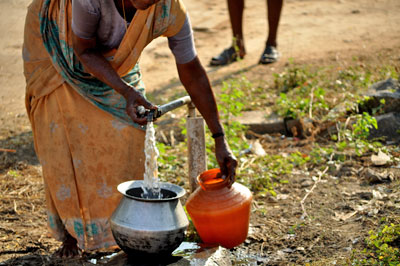
by Common Dreams
March 22, 2012
from
CommonDreams Website
|
Report sees biotechnology, agricultural
exports and virtual water trade
as the way forward |
A report released today on global water
security from the Defense Intelligence Agency assesses that in next
10 years, water instability will be likely in "nations important to the
United States", and says that in the next decades, the use of water as a
weapon will be more become more likely.
The report, which focused on the,
-
Nile
-
Tigris-Euphrates
-
Mekong
-
Jordan
-
Indus
-
Brahmaputra
-
Amu Darya,
...water basins, states that the availability of
potable water will not keep up with demand without better water management.

Project sites in rural India
While environmentalists have pointed to
agroecology, food sovereignty and viewing water as part of the commons as a
path towards responsible water management, the intelligence report sees
biotechnology, agricultural exports and virtual water trade as the way
forward.
Today, US Secretary of State
Hillary
Clinton, who requested the report, commented on the report in
a speech at the State Department, saying,
"As the world's population continues to
grow, demand for water will go up but our fresh water supplies will not
keep pace."
"These difficulties will all increase the
risk of instability within and between states," she said.
The report - Global
Water Security
-
We assess that during the next 10 years,
water problems will contribute to instability in states important to US
national security interests. Water shortages, poor water quality, and
floods by themselves are unlikely to result in state failure.
However, water problems - when combined with
poverty, social tensions, environmental degradation, ineffectual
leadership, and weak political institutions - contribute to social
disruptions that can result in state failure.
-
We assess that a water-related state-on-state conflict is unlikely
during the next 10 years. Historically, water tensions have led to more
water-sharing agreements than violent conflicts.
However, we judge that as water shortages
become more acute beyond the next 10 years, water in shared basins will
increasingly be used as leverage; the use of water as a weapon or to
further terrorist objectives also will become more likely beyond 10
years.
The report notes that agriculture is responsible for approximately 70
percent of the global fresh water supply, and implies the need for
genetic modified crops to deal with the
decreasing water supply.
From
the report:
-
Research to develop drought resistance
in crops has been conducted for several decades, but no
commercialization exists to date. During the next three decades,
selected crops could be developed that require half the water used
by current crops, but widespread cultivation of such crops is
problematic.
-
Limited experiments are being conducted
to develop food plants that can tolerate salt or waste water. The
advances in biotechnology may result in new plants or genetically
altered strains that can grow in salt water from the ocean or large
saltwater aquifers.
It also touts virtual water trade as one of "the
best solutions for water problems" and says that the U.S. will lead in the
export of virtual water:
The United States is also one of the highest
exporters of “virtual water” (water consumed in the manufacturing or
growing of an export product), providing numerous opportunities for
engagement with the rest of the world.
The reports sees other countries' water scarcity
as a boon for U.S. exports:
The United States can benefit from an
increased demand for agricultural exports as water scarcity increases in
various parts of the world. This would be especially true if states
expecting increased water scarcity rely upon open markets instead of
seeking bilateral land-lease arrangements in other countries to achieve
their food security.
Today, US Secretary of State
Hillary Clinton,
who requested the report,
commented on the report in a speech at the State
Department.
"I think it's fair to say the intelligence
community's findings are sobering. As the world's population continues
to grow, demand for water will go up but our fresh water supplies will
not keep pace."
"These difficulties will all increase the risk of instability within and
between states," she said.
"Within states they could cause some states to fail outright. And
between and among states, you could see regional conflicts among states
that share water basins be exacerbated and even lead to violence."

